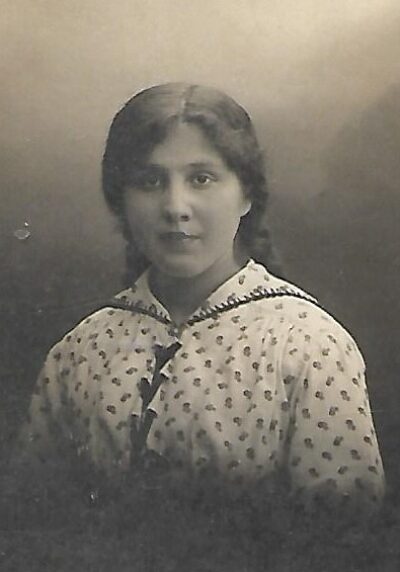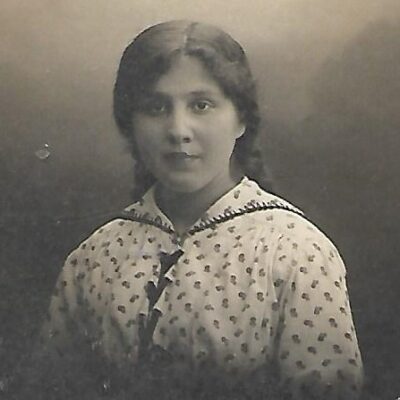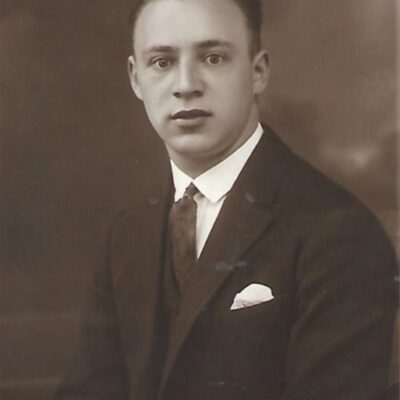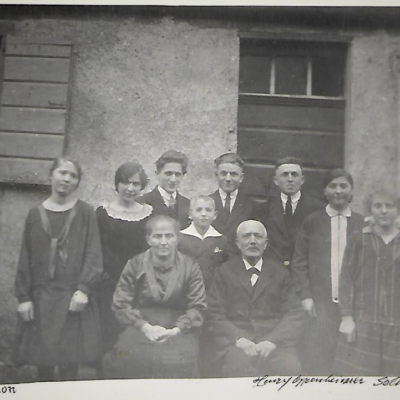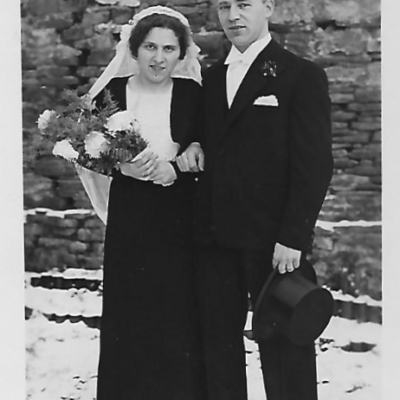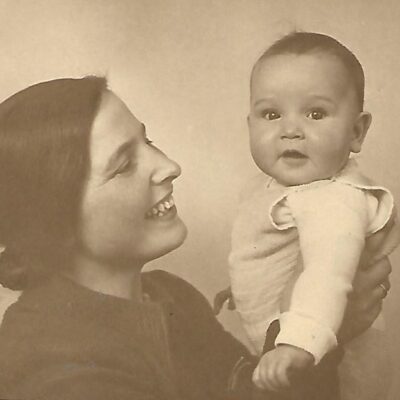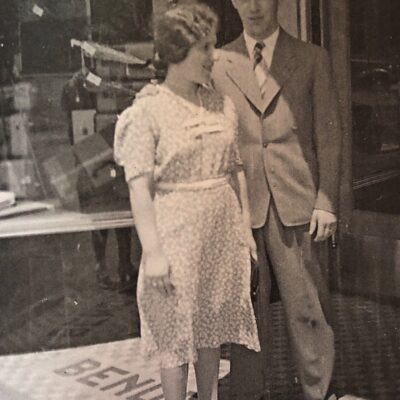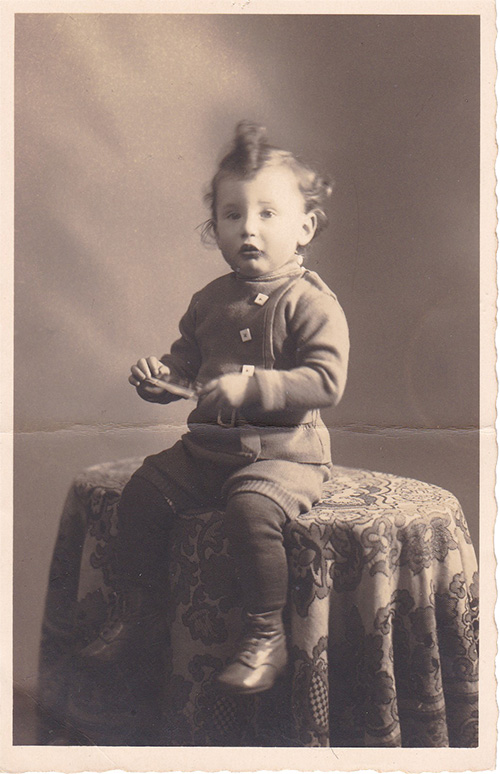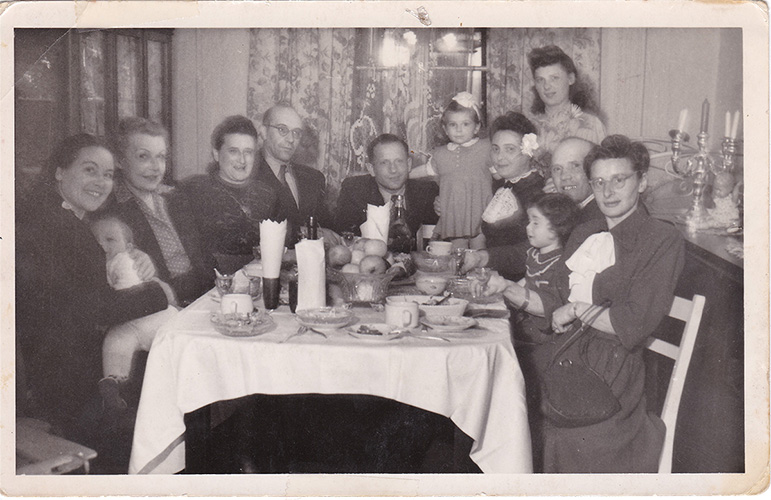Frieda Kahn Berger
Biography
Frieda Kahn and Hermann Berger grew up in small villages in Germany within walking distance of each other. They knew each other as children. Frieda was from Niederzissen and Hermann, from a slightly smaller village, Burgbrohl. A tailor from a long line of tailors, Hermann finished the eighth grade, the limit of public school in the village, and then an additional year of business school. Frieda was the oldest girl of eight siblings and had to drop out of school after the seventh grade to help take care of the younger children in the family.
When the Nazis banned Jewish participation in organizations and sports, both Hermann and Frieda helped form a Jewish youth organization. He became its president, and she, its secretary. Although they had known each other since childhood, this was the beginning of growing love. They married in December of 1937 and lived in Burgbrohl until they left for America in late February 1938, arriving in New York in early March.
Aware of the ever-tightening Nazi noose, a cousin already living in New York sent Hermann an affidavit to be able to come to the US. The plan was for him to come and then send for his wife, but a week before he was to leave, an affidavit for Frieda arrived as well. After rushing to get the needed permissions and papers from the German government and the American Consulate, the couple said hurried goodbyes to their families, and, on February 22, 1938, they boarded a ship in Hamburg on their way to New York, the first in their immediate families to leave Germany.
Half of Frieda’s siblings escaped to Shanghai, which had an open port at that time, and to Colombia. The other family members were not so fortunate. Those who had fled to Belgium and Holland were sent by the invading Nazis to Auschwitz, where they perished. One sister and her husband and child, who had remained in Cologne, were put on a train to the Minsk Ghetto but were murdered upon arrival at nearby Maly Trostinec. Frieda’s parents were sent to Theresienstadt, where her father died, and from which her mother was sent to Auschwitz and killed. Hermann’s two brothers, who had fled to Belgium and then France, and his father and stepmother, died in Auschwitz. With the help of a cousin who had already emigrated, his sister fled to London, where she eventually married and where she remained for the rest of her life.
On March 4, 1938, the Bergers arrived in New York on the SS Washington. Hermann was unable able to find permanent work as a tailor, so he registered with the National Refugee Service, an organization that was helping refugees resettle throughout the country. He was willing to go wherever steady work was available. Meanwhile, the Jewish community in Selma had decided to help a few refugees settle there. During a merchandise-buying trip to New York, four Jewish businessmen met with Hermann, resulting in his and Frieda’s move to Selma, although Frieda was very reluctant to leave NY, where they were with cousins and others who shared the refugee experience. But, of course, they went. They moved to a then-unknown town in the deep South, where they were almost the only immigrants in the small Jewish community.
The family joined Temple Mishkan Israel, the reform synagogue in Selma. Hanna Leone Berger, their only daughter, was born in 1942. As immigrants, separated from the remaining family and friends, Hermann and Frieda struggled with feelings of isolation, something Hanna wasn’t aware of until she became an adult. Unless she asked direct questions, her parents did not talk about their experiences or the past. She described them as “emotionally restrained” and generally quiet people. Hermann told Hanna that, as a young man still in pre-Nazi Germany, he discarded some of the traditional (Orthodox) beliefs and customs that he grew up with. Yet he became very active in the Jewish religious life in Selma. Frieda, who battled chronic depression, told Hanna that for years she had inner struggles with God. Yet she, too, participated in the religious activities and events of the Selma Jewish community. This community provided the base from which the Bergers adjusted to life in a new town and a new country.
Hermann died in 1971 and Frieda, in 1998. They are both buried in Selma, Alabama.
Photos & Documents
More Information
Minna Gottschalk
(1877 Niederzissen, Germany – 1944 Auschwitz)
Josef Kahn
(1967 Niederzissen, Germany – 1942 Theresienstadt)
Max Kahn
(1901 Niederzissen, Germany – 1942 Auschwitz)
Salomon Kahn (Grete [Margarete] Friedman, born 1907 Ludwigsburg, Germany)
(1904 Niederzissen, Germany – 1993 Cali, Colombia)
Emigrated to Palmira, Colombia then later moved to Cali, Colombia
Julius Kahn
(1905 Niederzissen Germany – 1974 Selma, AL)
Emigrated to Shanghai, then to Selma, AL
Jetta Kahn (Leo Abraham)
(1907 Niederzissen, Germany – 1942 Maly Trostinec Belarus)
Daughter, Ruth, also died at Maly Trostinec
Julia Kahn
(1909 Niederzissen, Germany – 1909 Niederzissen, Germany)
Lina Kahn
(1910 Niederzissen, Germany – 1942 Auschwitz)
Dorothea (Dora) Kahn (Ludwig Lewy)
(1912 Niederzissen, Germany – 1981 Selma, AL)
Emigrated to Shanghai, then to Selma, AL
Sally Kahn
(1914, Niederzissen, Germany – 1973, Palmira, Colombia)
Emigrated to Shanghai, then to Palmira, Colombia
Hermann Berger
(1904 Burgbrohl, Germany – 1971 Selma, AL)
Married December 26, 1937 Burgbrohl, Germany
Hanna Leone Berger
(1942 Selma – )
Frieda’s parents, Josef and Minna Kahn, were sent to Theresienstadt. Josef died there. Minna was then sent to Auschwitz where she was killed.
Frieda also lost three siblings at the hands of the Nazis: two in Auschwitz and one with her husband and child at Maly Trostinec outside of the Minsk Ghetto.
Frieda and her husband Hermann Berger, a tailor, were sent from New York by the National Refugee Service and sponsored by Synagogue Mishkan Israel after a Jewish tailor died in Selma.
After the war ended, the Bergers sponsored Frieda’s brother Julius Kahn, her sister Dora Lewy, and brother-in-law Ludwig Lewy, all of whom had immigrated to Shanghai, China in 1939.
Resources
-
History & Related Resources
Testimony of Hanna Berger (daughter)
July 1, 1991 / Montgomery, AL
Interviewer: Louisa H. Weinrib

